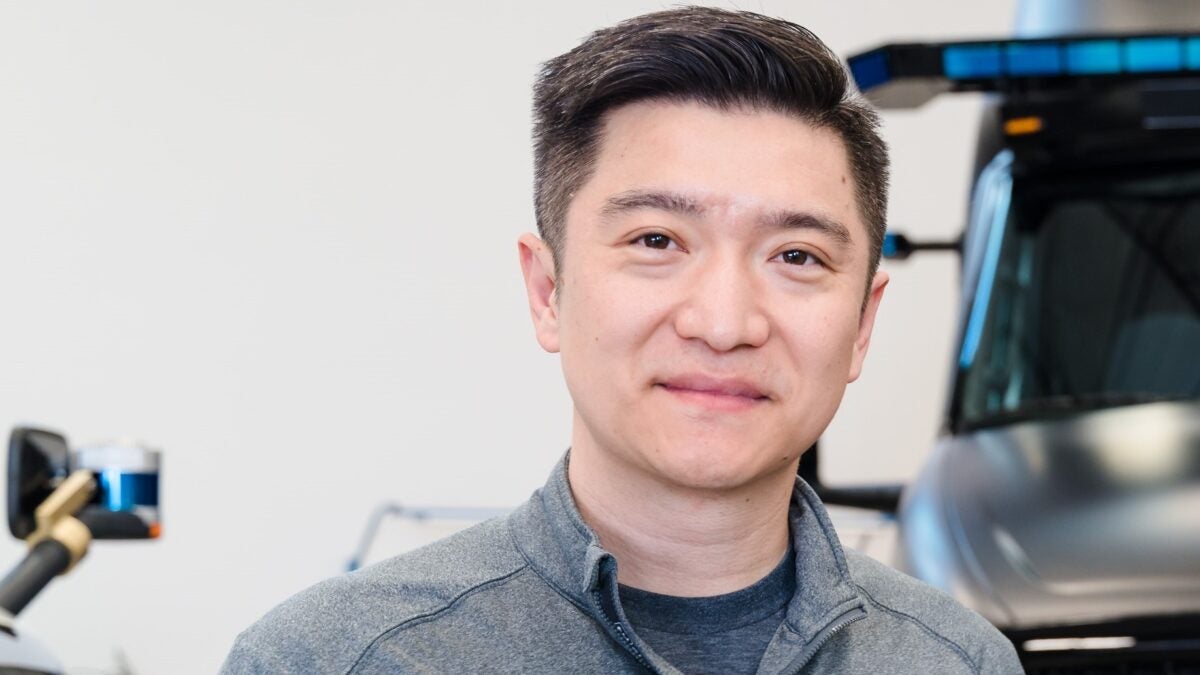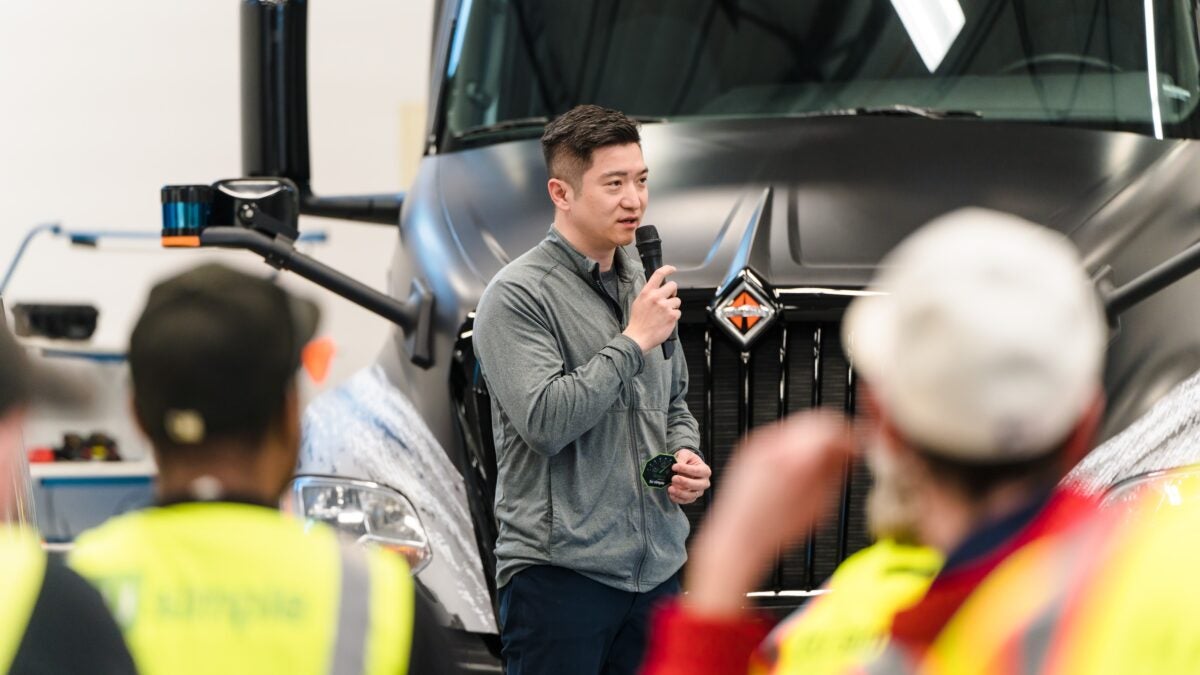TUCSON, Ariz. — Cheng Lu mostly watched from the sidelines for seven months as autonomous trucking startup TuSimple nearly imploded from the pressure of internal politics and external investigations. Upon returning as CEO in November after being ousted in an awkward succession, Lu quickly assessed the state of affairs and moved to stabilize the company.
So how is that going?
In his first public interview since being rehired to the top management post, Lu told FreightWaves that TuSimple is making progress. But it has a lot of work ahead to regain the trust of customers and investors.
“The concern was that your share price tanked 60%, and there wasn’t a clear direction on how to manage this thing,” Lu said in a 45-minute interview at the company’s research and testing facility on March 14. “We’re not a company that has stable, cash-producing assets. We’re a company [whose] greatest asset is our people, our partners, our credibility.”
Without actions, including firing a quarter of the workforce — 350 people — in December, Lu saw a downward spiral continuing.
“Going back to that startup mentality where everyone’s wearing multiple hats, where we’re all rallying around a common challenge, that is increasing productivity,” Lu said. “You have to stabilize the people. We were in danger of losing a lot of great talent.
More to read:
- With $1B in the bank, reputationally dinged TuSimple looks ahead
- Current TuSimple employees discuss their work after mass layoffs
“I think a hundred percent we’re beginning to turn up, and I think the next phase is going to be our relaunch. We’re gearing up to speak with investors now. Before, we couldn’t because our hands were tied with all the stuff that was going on.”

Months of TuSimple turmoil
The decline at TuSimple may have started shortly after its greatest achievement — the successful 80-mile driverless run of a Class 8 autonomous truck retrofit with the company’s self-driving software in December 2021.
Code-named Ghost Rider for the Marvel comic book anti-hero played by Nicholas Cage in the 2007 movie, the run set TuSimple apart from competitors.
Co-founder and then Chief Technology Officer Xiaodi Hou oversaw that activity. Three months later, he declared himself CEO, pushing aside Lu, who was well liked and respected on Wall Street for his private equity background. Most of Lu’s executive team followed, including CFO Pat Dillon, a former Morgan Stanley investment banker with street cred.
The April 2022 noninjury crash of a driver-supervised TuSimple truck on Interstate 10 west of Tucson led to months of negative publicity and questions about the readiness of autonomous trucks on the nation’s roadways.
Then on Oct. 30, TuSimple’s independent directors fired Hou as CEO. Ten days later, Hou, with the support of co-founder Mo Chen, fired the company’s four independent directors, temporarily leaving Hou as the only director. Chen had stepped down as executive chairman of the board in June when Hou added the chairman’s role to his list of titles.
Chen returned as a chairman in November and Lu was rehired as CEO with a $15 million severance package to prevent a recurrence of what happened in March 2022.
Nasdaq listing in jeopardy
Over the following months, Chen and Lu appointed new independent directors, elevated interim CFO Eric Tapia to the permanent role and began working through wreckage from the resignation of KPMG as its auditor just ahead of filing its third-quarter financial report. TuSimple is in arrears on that filing and a year-end report with the Securities and Exchange Commission.
That has jeopardized TuSimple’s Nasdaq listing. But the exchange is giving TuSimple until May to catch up. The company is in the process of hiring a new auditor, Tapia said. KPMG quit because of TuSimple’s reputation issues, not because of any concerns with its finances.
But there’s more:
- An internal audit over TuSimple workers helping a China-backed startup Hydron Inc. founded by Chen is ongoing.
- The Federal Motor Carrier Safety Administration on March 2 closed its investigation into the April 2022 crash without assessing penalties.
- Ongoing efforts to persuade the Committee on Foreign Investment in the U.S. that TuSimple is protecting U.S. intellectual property are making progress.
- The company is seeking another manufacturing partner after a 2 1/2-year collaboration with Navistar ended in December.
- A war of words has calmed between co-founders Hou and Chen after Hou took to LinkedIn with a screed over his resignation from the board and Chen fired back in a letter from the board that was included in an SEC 8-K filing.
The China questions
The internal audit findings over its dealings with Chen’s Hydron Inc. startup are of specific interest to CFIUS, which closed an investigation of TuSimple in February 2022 with the signing of a National Security Agreement. Asked whether selling its China subsidiary, which the company has hinted it might do, might mollify CFIUS, Lu said it could.
“Clearly geopolitics is a risk factor for us,” Lu said. “We have been looking at options to increase competitiveness. Part of that could be divesting China. We have to explore ways to alleviate the ongoing concerns.
“Since I came back, the temperature [with CFIUS] has cooled down a lot,” Lu said. “There were a lot of bad headlines that took people by surprise. The initial reaction is, ‘Something nefarious is going on.’ Since then, we reconstituted the independent board, and we reengaged in the independent audit committee investigation.”

Rethinking autonomous trucking
Lu has reorganized TuSimple, stripping it down to operate more like the startup founded in 2015. A fleet of freight-hauling, driver-monitored trucks is no more. Even as the company celebrated 10 million miles of autonomous driving earlier in March, running freight for freight’s sake is no more.
“This ties into our larger strategic thinking of, OK, what is the highest ROI, the best use of capital? What is it that really creates value for TuSimple? What is it that our shareholders care about? Ultimately it is, how do you follow up all the great things we did before. … How do you get to commercial launch?
It won’t be through providing hugely discounted freight capacity, demand for which has fallen off in a loose freight market.
“You want density in the lanes and so recreating a freight network that has trucks, that’s not difficult. You could set that up in a few months. If you’re cheap enough, you get business.”
Learning the freight business
Lu practically admitted TuSimple was competing with its customer carriers but framed it as a learning experience about what matters most to the freight industry: cost and reliability.
“As a shareholder, it was nice to see some revenue, but not at the cost of losing 30, 40 cents per mile. If we’re going to lose $5 million or $10 million of revenue, I’d rather spend that on what matters the most, which is getting to commercial launch on one lane.”
Even as supplier delays for certain safety-focused components for driverless trucks push out plans for some competitors, TuSimple has enough experience and redundancy to safely operate on the familiar Tucson-to-Phoenix route it piloted 15 months ago, Lu said.
“We have to run it reliably and with a cost per mile that can get lower than a human driver,” he said. “So, it’s not just running a self-driving truck. We’ve done that already. It’s taking that foundation and increasing the reliability, day and night, multiple times per day, multiple times per week, and then reducing the cost per mile.”
Related articles:
Feds close probe into TuSimple autonomous truck crash
Hydron startup plans hydrogen-powered autonomous trucks










